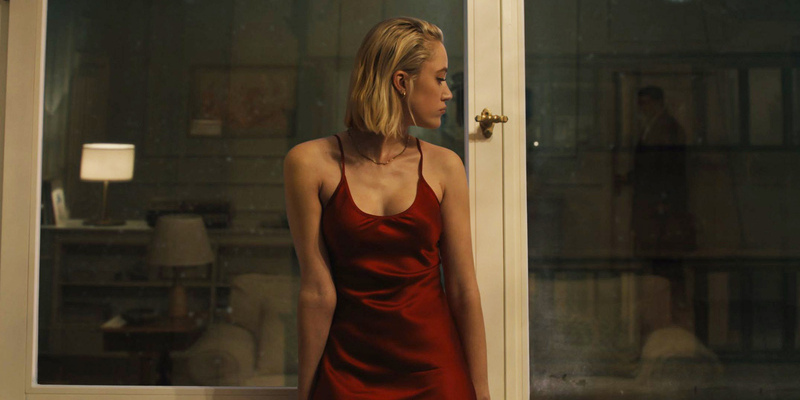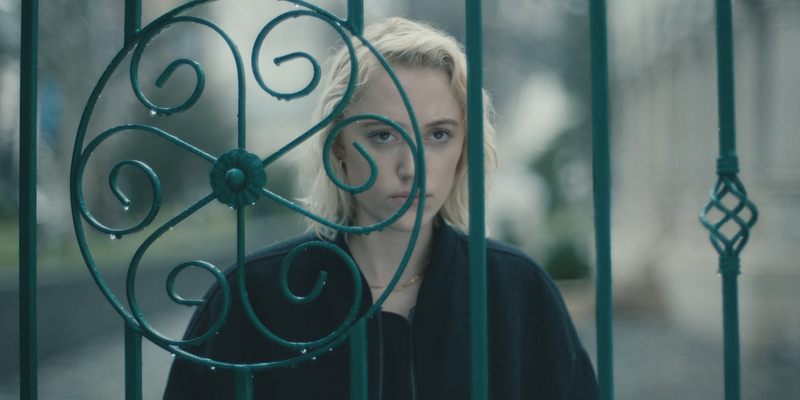
Review by
Eric Hillis
Directed by: Chloe Okuna
Starring: Maika Monroe, Burn Gorman, Karl Glusman, Madalina Anea

Having starred in the modern horror classic
It Follows, Maika Monroe knows a thing or two about playing a stalking
victim. She's being stalked once again in director Chloe Okuna's
Watcher. Or is she? Okuna structures her film in a manner that makes us second
guess her heroine, only to ultimately scold us for ever doubting
her.

Monroe plays Julia, a former actress who has moved with her
half-Romanian husband Francis (Karl Glusman) to Bucharest, where
he has landed a job at the local office of some faceless American
corporation. On the night the couple moves into their spacious
apartment, Julia spots a figure standing in the dimly lit window of an
apartment across the street. Is he staring at her or just at the world
outside his window? Julia seems convinced it's the former but pulls the
curtain and forgets the matter.
When the beheaded victim of a serial killer dubbed "The Spider" is
discovered not too far from her new apartment, Julia begins to grow
increasingly uneasy about the potential voyeur living across the street.
She flees a repertory cinema when a man, who may or may not be her
would-be stalker, sits behind her. Did the man purposely choose this
seat or is assigned seating in place? (As a man, I always feel
uncomfortable when a cinema's assigned seating puts me right behind a
woman on her own in a half empty auditorium). In a local supermarket she
spots a man (Burn Gorman) who appears to be looking at her, or
maybe he's simply returning her own suspicious gaze. Later she follows
the man to his janitorial job in a basement strip club, becoming
something of a stalker herself.

Initially Watcher appears to be an
Eyes Wide Shut style examination of Anglo-Saxon frigidity,
paranoia and fear of the other. Unable to speak Romanian, Julia gets
mildly angry whenever her husband speaks with the locals in their own
tongue. This might be read as Okuna critiquing the very Anglo-Saxon
attitude of expecting the rest of the world to cater to our needs,
something compounded by the fact that none of the Romanian dialogue is
subtitled. I wonder how the film plays for those who can understand that
language and know exactly what is being said between Francis and the
natives. Are they actually mocking Julia, as she fears, or simply
engaging in everyday work gossip, as Francis claims?
As the film progresses it becomes less clear whether Okuna is really
examining America's self-centred place in the world, as her movie
evolves into a more run of the mill stalking thriller. The message
loudly becomes "believe women," and we feel guilty for not fully
committing to Julia's side of the story. But Okuna designs her film's
first half in a way that purposely makes us question her heroine's
account of things, so it's highly deceitful for her to then scold us for
simply ingesting the visual evidence we've been presented with. Horror
films always have the Francis figure, the husband/boyfriend who doesn't
believe the heroine, but they also make it very clear to the audience
that the heroine isn't going mad by showing us the fear she's
experiencing. Okuna mostly has her heroine tell us she's in danger,
which just isn't how cinematic storytelling works.

Perhaps the film would play differently if I were an American and
immediately took Julia's side. But I'm a European, and we do look out
our windows and we do wave back if we see someone waving at us. Julia is
part of a generation of Americans that have been raised to see strangers
as potential threats rather than possible friends. I hope Europe never
becomes that paranoid.

